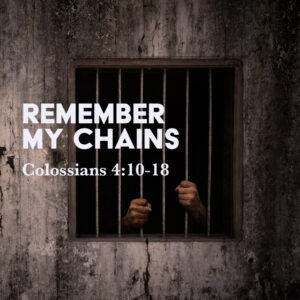Colossians 4:10-18: Remember My Chains
July 9, 2023
TODAY'S BIBLE READING:
1 Chronicles 20-22, Psalm 133-134, Luke 9:18-27, Colossians 4:10-18

In this passage we have many particular examples of how Paul’s friendships functioned within a context of gospel priority and kingdom advancement. There are models here for us of relational interweaving for the purpose of honoring Christ.
Notice, first, his relationship with Mark. This is the same Mark that earlier Paul and Barnabas had argued about in Acts chapter 15. They had disagreed about taking Mark along with them, and had gone their separate ways because of that disagreement. But now Paul is reconciled to Mark, has forgiven whatever needed to be forgiven, and is even commending Mark to the churches. What a wonderful example of forgiveness and gospel reconciliation is this! Do you have someone in your life – a fellow Christian – with whom you are not reconciled? Is there something that you could do to bring about that reconciliation?
Then notice the comfort that Paul receives from his fellow Jews. He does not have many of his own nationality among his co-workers, but those who are that nationality have proven a comfort to him — presumably, not only because there was a cultural familiarity of having those from that background working with him, but also because they were a testimony to God’s continuing faithfulness to his Jewish people, and Paul’s longing to see them saved. Who is there in your relational orbit that you can give thanks for that witnesses to you of God’s power to save?
Then notice Epaphras. What an example Epaphras is of the way to “wrestle in prayer.” Prayer is not simply “saying prayers.” In God’s sovereignty, a wrestling with God in prayer is frequently the way that God determines to do that which will most bless his people and advance his kingdom. He is praying that the Colossians would stand firm in the will of God, mature and fully assured. Here we see how to pray (wrestling) and what to pray (stand firm in all the will of God, mature and fully assured). Who is this today that you can pray for in the Ephaphras way?
Then we come to Luke – famous for the two books in the New Testament that bear his name, Luke and Acts. Here is someone who is medically qualified, who is using his gifts for the advance of the kingdom. Sometimes we can think that to be used by God we must be ordained, or a pastor or a missionary. But here is Luke the doctor using that position to write and minister for Christ and his glory. How can you use your skills, your profession, for the glory of Christ?
Then notice Archippus. For whatever reason – unknown to us – he needed a particular word from Paul. “See to it that you complete the ministry you have received in the Lord.” Notice how Paul applies gospel truth to the individual needs of one man. And then notice the instruction itself: complete what you have been asked to do. So many gospel projects fail, or are not what they could have been, because people give up when things get hard or they become bored by the repetitive perseverance required to see it through. Don’t be like this. Complete what God has given you to do.
Finally, Paul’s last word: “Remember my chains.” Here he is suffering for the gospel. This apostle and his words are genuine and true and trustable.
ABOUT THE AUTHOR
Josh Moody (Ph.D., University of Cambridge) is the senior pastor of College Church in Wheaton, IL., president and founder of God Centered Life Ministries, and author of several books including How the Bible Can Change Your Life and John 1-12 For You.
WANT MORE?
To receive God Centered Life devotionals directly in your inbox, as well as other resources, enter your email address in the form at the bottom of this page and click "subscribe."

